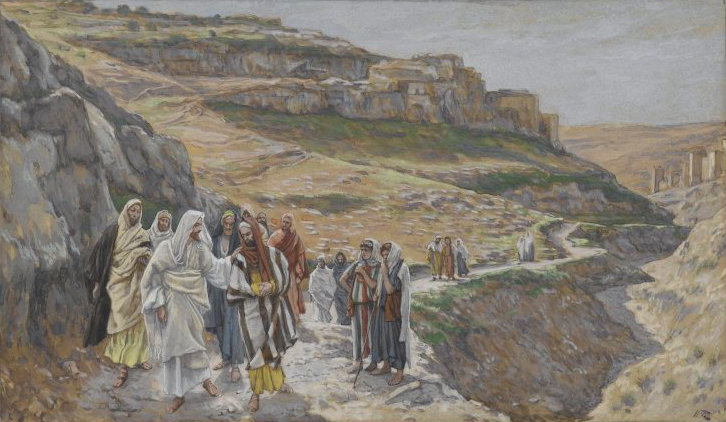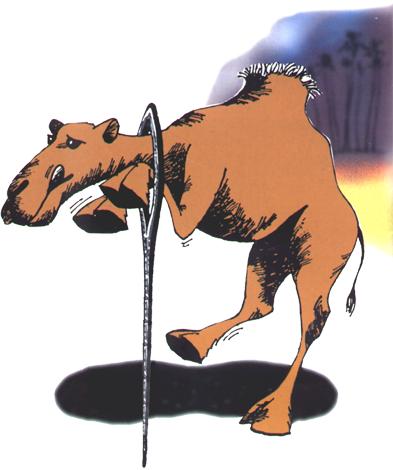Scripture Readings: Job 23:1-8, 16-17; Ps. 90:12-17; Heb. 4:12-16; Mark 10:17-31 Sermon by Ted Johnston (From Mark 9-10, drawing on commentary from New Bible Commentary, Bible Knowledge Commentary, and Mark for Everyone by N.T. Wright)
The High Cost of the Kingdom
Introduction
Today’s reading in Mark 10:17-31 falls within a section that spans Mark 9:14-10:52. That section, which could be titled The High Cost of the Kingdom, occurs near the end of Jesus’ life on earth.
Though Peter and the other disciples are beginning to understand that Jesus is the promised Messiah, they do not yet see that Jesus is the Messiah who will suffer to serve and to save. They do not comprehend the high cost of the kingdom—the cost Jesus will pay to be its King, and the cost the disciples of Jesus will pay as its citizens.
This sermon is not about buying our way into God’s kingdom—it’s about participating with Jesus in his kingdom life, thus conforming our lives to his kingdom ways. There is a price to be paid for doing so, and Mark sets it out in this section by highlighting six characteristics of Jesus: prayerful dependence, self-denial, faithfulness, generosity, humility and persistent faith. Let’s look at all six with a focus on number four: generosity.

(public domain via Wikimedia Commons)
1. Prayerful dependence
[Note to preacher: for the sake of time, don’t read the passages referred to, except in section number four. In the other sections, just refer to the passage to help your members understand the overall context.]
First, we see in Mark 9:14-32 that Jesus is grieved by two things: the opposition he is receiving from the teachers of the law and the unbelief that is coming from the crowds and from his own disciples. The lesson is that kingdom victory (in this case over illness) depends not on the extent of our faith, but on the extent of Jesus’ faith, which he then, by the Spirit, shares with us.
In that context of human weakness, Jesus explains that part of the high cost of the kingdom is to turn to him in dependent prayer. Why? Because he alone pays the full kingdom cost, which is his soon-coming sacrificial death. Sadly, the disciples fail to understand.
2. Self-denial
In Mark 9:33-50, the disciples are shown that part of the cost of the kingdom is to abandon one’s need for supremacy and power. Self-denial is the path to kingdom greatness, which Jesus illustrates by pointing to weak, helpless children.
Because Jesus’ disciples were unable to practice self-denial perfectly, this admonition points to Jesus, who alone is perfect. Our calling is to trust in him—to embrace his person and follow his kingdom ways. Those ways of Jesus are not about being the greatest or the most powerful, but of denying self to serve God by serving people.
3. Faithfulness
In Mark 10:1-16, Jesus shows that the high cost of the kingdom includes faithfulness in one’s closest relationships, including marriage. Jesus drives home his point by pointing to innocent little children as positive examples. Only those who receive the kingdom with the simple faith (trust) of a child truly experience what the kingdom is all about.
4. Generosity
Now we come to today’s Gospel reading in Mark:
[If this passage was not read during the scripture reading, read it now.]
As Jesus started on his way, a man ran up to him and fell on his knees before him. “Good teacher,” he asked, “what must I do to inherit eternal life?”
“Why do you call me good?” Jesus answered. “No one is good– except God alone. You know the commandments: ‘Do not murder, do not commit adultery, do not steal, do not give false testimony, do not defraud, honor your father and mother.'”
“Teacher,” he declared, “all these I have kept since I was a boy.”
Jesus looked at him and loved him. “One thing you lack,” he said. “Go, sell everything you have and give to the poor, and you will have treasure in heaven. Then come, follow me.”
At this the man’s face fell. He went away sad, because he had great wealth.
Jesus looked around and said to his disciples, “How hard it is for the rich to enter the kingdom of God!”
The disciples were amazed at his words. But Jesus said again, “Children, how hard it is to enter the kingdom of God! It is easier for a camel to go through the eye of a needle than for a rich man to enter the kingdom of God.”
The disciples were even more amazed, and said to each other, “Who then can be saved?”
Jesus looked at them and said, “With man this is impossible, but not with God; all things are possible with God.”
Peter said to him, “We have left everything to follow you!”
“I tell you the truth,” Jesus replied, “no one who has left home or brothers or sisters or mother or father or children or fields for me and the gospel will fail to receive a hundred times as much in this present age (homes, brothers, sisters, mothers, children and fields– and with them, persecutions) and in the age to come, eternal life. But many who are first will be last, and the last first.” (Mark 10:17-31)
Here Jesus presses the point about the high cost of the kingdom. The rich man who approached Jesus possessed everything except what really counts: eternal life (which is kingdom life). Though he wants that life, he is unwilling to pay the high cost to possess it. Like the well-known story of the monkey that cannot get out of the trap because it’s unwilling to let go of what’s in its hand (see picture below), this rich man is unwilling to let go of his fixation with material wealth.

Though he is clearly lovable and eager; and, no doubt, morally upright, the rich man cannot face what it will mean for him (given his situation) to follow Jesus (which is what eternal life is all about). So, the rich man goes away sad from Jesus and we hear no more of him. He made his choice, at least for now.
Evaluating the situation, Jesus tells his followers that it is very hard for the rich to enter the kingdom of God. Indeed, without God’s help, it is utterly impossible! To make his point, Jesus uses a comical proverb—no camel can go through the eye of a needle!

Jesus also teaches that giving money to the poor and other sacrifices we make for the kingdom, results in reward (treasure) for us—but in heaven, not here on earth. The more we give, the more we will receive. However, this does NOT mean that if we give money to God’s work, we get more back, as some health-and-wealth (prosperity) groups falsely teach.
What Jesus is saying is that spiritual rewards in the kingdom (both now and in the future) will far outweigh any sacrifices we may make now to follow Jesus, even when following him means hardship, including persecution.
Speaking of that hardship, appended to this passage is another foretelling of Jesus’ suffering, this time in more detail:
They were on their way up to Jerusalem, with Jesus leading the way, and the disciples were astonished, while those who followed were afraid. Again he took the Twelve aside and told them what was going to happen to him. “We are going up to Jerusalem,” he said, “and the Son of Man will be betrayed to the chief priests and teachers of the law. They will condemn him to death and will hand him over to the Gentiles, who will mock him and spit on him, flog him and kill him. Three days later he will rise.” (Mark 10:32-34)
Something in Jesus’ behavior, as well as in his words, causes the disciples to be astonished and the crowd that is following them to be afraid. Somehow, they feel that a crisis is very near, and they are right.
Jesus’ words here are a powerful reminder of who pays the ultimate, very high cost for the kingdom—and Jesus does so on our behalf. Never forget that. He is the ultimate generous one, and we are called to follow him, to share in his generosity. What are we holding onto that prevents us from being generous, like Jesus? Something to ponder and pray about.
5. Humility
As the passage on the high cost of the kingdom continues, we come to Mark 10:35-45, where James and John, sons of Zebedee, come to Jesus seeking a high position in his kingdom. It’s hard to believe that they would be so self-promoting; so self-centered. Yet, we know that such attitudes are deeply ingrained in our fallen human nature.
Had these two disciples realized the true cost of high position in the kingdom, they would not have dared make this request of Jesus. Jesus warns them that they will suffer, but that suffering will not necessarily mean high position in the kingdom, because everyone must endure it. High position is for God alone to give.
The other disciples, who are, no doubt, just as self-centered as James and John, are angry at their request. They likely want these places of power and prestige for themselves. So, Jesus patiently explains again the totally different kingdom value, where true greatness is humble service.
Jesus, himself, is the great example of this humility. He came to be the suffering servant of God prophesied in Isaiah 53, who would give his life as “a ransom for many.”
6. Persistent faith
The passage then concludes with Mark 10:46-52, where Jesus, along with his disciples, leaves Jericho, headed for Jerusalem, where Jesus will suffer and die. Along the way, they encounter a blind man named Bartimaeus who begs Jesus for mercy. Jesus responds by restoring the man’s sight, declaring “your faith has healed you.” Bartimaeus then follows Jesus.
At one level, this is a lesson about human faith, which, though imperfect, is effective when persistent. Ultimately, however, it’s about Jesus’ persistent, perfect faith.
Conclusion
There you have it—the high cost of the kingdom: prayerful dependence, self-denial, faithfulness, generosity, humility and persistent faith. We experience the kingdom of God as we embrace and practice these characteristics. Sound a bit daunting? Yes, until we realize that these are characteristics of Jesus himself—characteristics that he, by the Spirit, shares with those who trust him and in trusting, follow him.
Our sharing in Jesus’ kingdom living is never perfect, but as we follow Jesus, he “rubs off” on us. This is the way of Christian discipleship. It’s not about earning a place in God’s kingdom—we have been given that place in Jesus. It’s not about earning God’s favor—we have God’s favor because of Jesus. What it is about is sharing in Jesus’ love and life. He possesses all these characteristics perfectly and abundantly and is willing to share them with us, and that’s exactly what he does, through the ministry of the Spirit.
Dear friends, followers of Jesus, open your hearts, and your whole lives to Jesus. Follow him and receive from him! Enter fully his kingdom.



Thanks, Ted, for the encouraging message, Dan